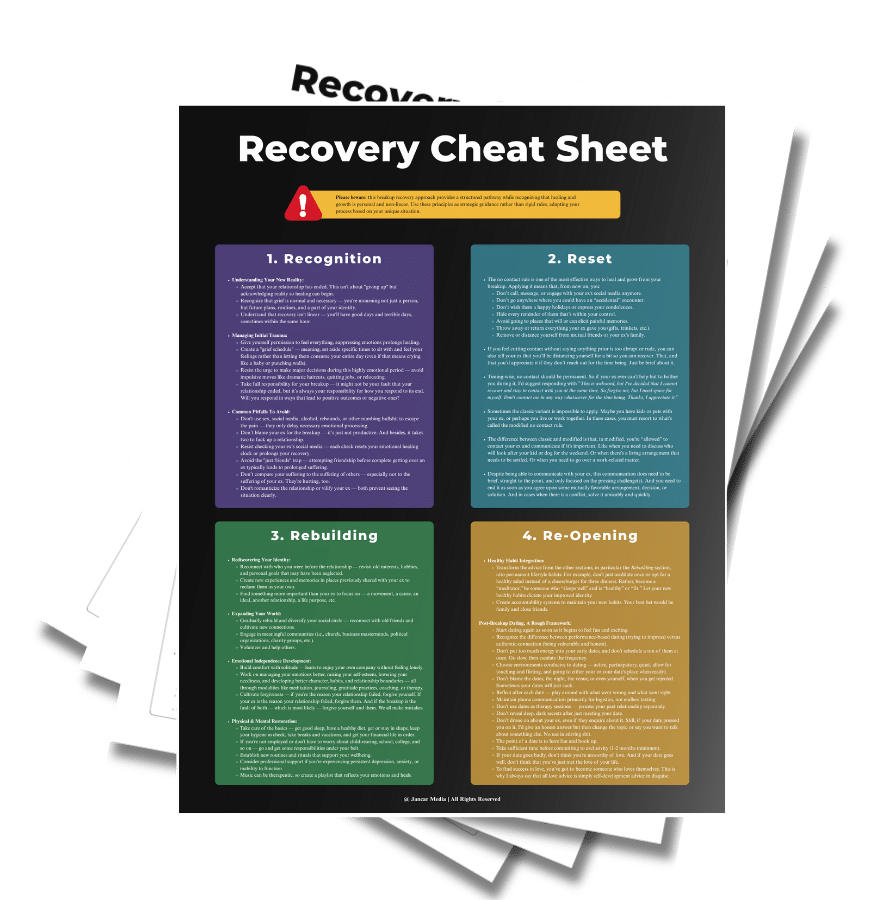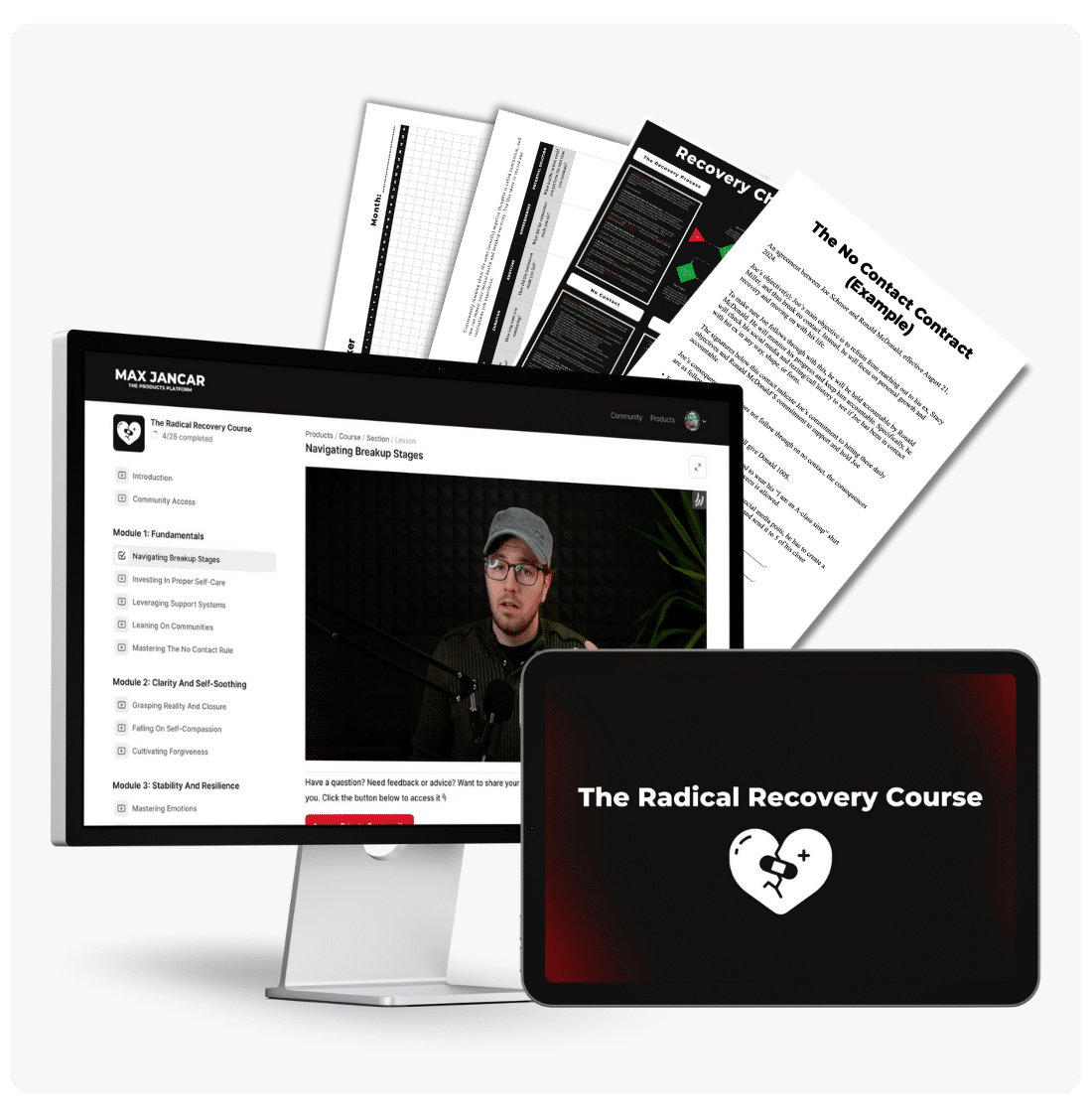Click play to listen to this article.
In the aftermath of a breakup, it’s not uncommon to find oneself grappling with regret. Whether fueled by unresolved issues, personal mistakes, or an idealized perception of our dead relationship, regret can cast a heavy shadow over our ability to heal and move forward.
In this article, I’ll delve into the intricacies of navigating regret post-breakup, offering insights and practical strategies to help you not only cope with the feeling but also emerge as happier, more resilient, and at peace in spite of it.
So let’s fucking do this.
A guide to breakup recovery based on embracing discomfort, extracting wisdom from dark moments, and healing through evidence-based practices.
Order Your Copy1. Cultivate Proper Understanding
Regret isn’t inherently bad; it can actually be useful at times. For it often spurs us into productive and empowering action that improves our lives.
If you never paid much attention to your ex and took them for granted, you may regret it so much that you purposefully push yourself to be more attentive and loving in your next relationship, causing it to be more fulfilling.
If it’s been poor communication that led to your breakup, your regret could drive you to improve your communication skills and prioritize open and honest discourse in your future relationships, improving them in the process.
If you refused to make any compromises with your ex, your regret might prompt you to become more flexible and willing to meet your next partner halfway more often.
That said, for some people, regret can indeed turn toxic.
It can materialize into deep-seated shame, making us feel like we’re a bad person. It can lead us to talk negatively to ourselves, further leading to diminished self-esteem. It can trap us in never-ending mourning about what we could’ve or should’ve done when we were still together with our ex, paralyzing us in the process.
If you’re currently dealing with healthy regret, get back to flossing your cat — you’ll be just fine. However, if you’ve noticed your regret turning toxic and causing you to stay stuck in the past, perhaps endlessly ruminating about your ex even, consider the rest of the advice from this article.
2. Own Your Fuckups
Maybe you made the wrong choice. Maybe you said the wrong thing. Perhaps you leaped in the wrong direction.
Who gives a fuck.
Own it. Own your fuckups. The past is dead and you can’t really go back. So move forward, despite the regret.
Go to the gym. Get your finances in order. Stop eating junk food. Book therapy. Do some meditation or journaling. Date around a bit. Invest in yourself, no matter how you feel.
Granted you don’t have some mental disorder, your ability to deal with regret that’s burdening you is directly proportional to the amount of self-care and improvement you throw yourself in. The more you invest in yourself, the easier you’ll cope with your regret. But the less you invest in yourself, the more difficulties you’ll have coping with it.
An online interactive video course that teaches you how to get past a breakup so you can create a new possibility for love (with your ex or someone new).
Get Instant Access3. Forgive Yourself
Since regret begets guilt, shame, and self-recrimination, finding a way to forgive yourself for whatever you regret can relieve you of some of the negative feelings that keep bringing you down.
For those uninitiated, to forgive yourself simply means choosing to not let past events define how you feel about someone or something in the present. Certainly, this is a gradual and often challenging process, but here are some practical tips you can use to make the whole thing easier.
For one, make a deliberate decision to let go of any anger, resentment, or disappointment you feel about yourself. Then accept the mistakes you’ve made that perhaps hurt your relationship (more on this later).
If your actions have affected your ex, consider expressing remorse and offering a sincere apology. While this might not always be possible or appropriate, it can be a fair gesture.
4. Question Your Narratives
Our minds are always constructing narratives to explain our feelings and experiences. These narratives are rarely accurate and often unhelpful, yet, we need them because they hold our sense of self in place.
By learning how to question your narratives, you can gain a greater perspective on how bad the aftermath of your breakup actually was. And if you’re honestly questioning yourself, you’ll likely find out that it wasn’t nearly as bad as you thought, leading to an easier time ejecting your regret.
Sure, maybe the breakup hurts now. But who says it won’t be the best thing that ever happened to you years later?
Maybe it will lead you to find an even better partner. Maybe it will lead you to find a greater appreciation for life. Maybe it will help you realize you have a lot of emotional work to be done on yourself and propel you toward unprecedented self-improvement.
Here’s a secret: most breakups are like this. Most breakups lead to growth and positive change. Most people, in fact, once they’ve dealt with their pain, tell me that their breakup was their most important and empowering experience and how they’re grateful for it.
5. Learn From The Shitshow
Regret serves an adaptive purpose. Meaning it can help you or hurt you. When you feel regret, you can either think about your past mistakes and feel sorry for yourself or you can take steps to ensure you don’t repeat those past mistakes.
Maybe getting into the breakup is your fault. Instead of beating yourself up about it, use your pain to identify the issues underlying your fuckup.
- Were you too absent?
- Were you too selfish?
- Did you constantly seek validation?
- Were you a shitty communicator?
- Did you have unrealistic standards?
- Did you cheat and lie and got caught?
- Did you always cause drama and arguments?
You let go of your regrets by accepting these sorts of mistakes, figuring out what happened, and integrating that experience into your understanding of who you are now.
6. Don’t Take It To Heart
Many people take failure to heart, especially breakups. In fact, for most, having a breakup equates to being an unworthy sack of shit. This view only results in a knock-on effect on self-esteem, which obviously harms future relationships.
- It makes us settle for relationships that aren’t what we want.
- It makes us stay in relationships for longer than we should.
- It makes us tolerate our partners even when they treat us as second-class citizens.
- It makes us put our partners on a pedestal and butcher our identity and character to please them.
- It makes us ignore any signs of incompatibility and red flags.
Need I go on? You get the point.
You’re not an inadequate or unworthy person for getting into a breakup. You just made a few mistakes. Like we all do. Don’t define yourself by them nor identify with them. As I wrote in my last point, learn and grow from them instead.
7. Consider Your Future
Saved the best for last.
Think about how your breakup will feel 3-5 years into the future and in what ways it will affect your life. Write everything down.
What you’ll likely find is that you’re exaggerating your breakup’s consequences and that there is a silver lining hidden within the whole dumpster fire, after all — making a significant chunk of your regret irrelevant. Therefore, easier to deal with.
That said, if you can’t find any good in the bad, it simply means you need more healing. So, in that case, give yourself more time to work on yourself and apply the other things on my blog. And once you feel better and can think more rationally, return to this exercise and give it another go.
This cheat sheet lays out 40+ solutions to overcoming a breakup so you can create a new opportunity for love — be that with your ex or someone completely different.
Get The Free Cheat Sheet


